Conservation of ancient rock paintings and rock carvings in the Upper Indus of Northern Pakistan
The corridor of Buddhist rock paintings and rock carvings in the Upper Indus region of northern Pakistan is not only an extremely valuable historical and cultural heritage of the local people, but also a cultural heritage belonging to all mankind. Many Chinese scholars and organizations are contributing to the conservation of rock paintings and stone carvings.
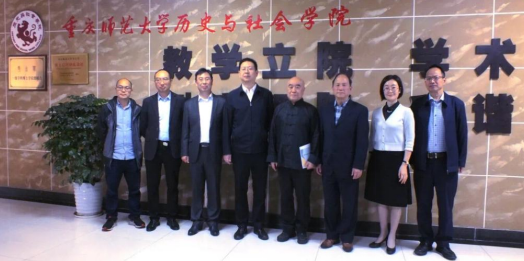
On the morning of May 27th, 2021, Mr. Li Xiguang, professor of Tsinghua University, doctoral supervisor, was invited to Chongqing Normal University to give a lecture on "Archaeological Research in the Northern Mountainous Areas of Pakistan" to more than 100 students and teachers of the archaeology department of the College of History and Social Sciences. In the lecture, Prof. Li Xiguang talked about the significance of the archaeology of the northern mountains of Pakistan for the study of Chinese archaeology and Chinese history, the relationship between the archaeology of northern Pakistan and the Indus civilization, and the activities of Chinese ancestors in the upper reaches of the Indus River. The confluence of the Hunza, Gilgit, Swat, Kabul and Indus Rivers in the mountains of northern Pakistan has preserved a wealth of rock paintings and inscriptions. The inscriptions include Kharosthi, Brahmi, Sutra and also Chinese. The preservation and study of this cultural heritage is a common responsibility of mankind.
On June 23, 2023, a seminar on "Pakistan-China Cooperation in Research and Conservation of Petroglyphs in the Basha Reservoir Area" was held in Islamabad, hosted by Pakistan-China Society and presided over by Prof. Li Xiguang, Director of Pakistan Culture Research Center, School of Journalism, Tsinghua University, with the attendance of Chairman of Defense Committee of the Senate of Pakistan, Mr. Mushahid, Mushtaifa, Executive Director of Pakistan-China Institute, Prof. Hani, Director of Takshila Institute of Asian Civilization, Prof. Muzuddin, archaeologist of northern Pakistan, teachers and students of Pakistan Culture Research Center of Journalism School of Tsinghua University, Prof. Kong Lingyuan and Zou Houxi of Archaeology Department of Chongqing Normal University. Mushahid said, "Protecting the Buddhist rock painting corridor in the Upper Indus will be one of the most important initiatives for the builders of the China-Pakistan Economic Corridor and the archaeologists of the two countries to implement the Global Civilization Initiative and flourish the hundred gardens of the world's civilizations." The more than 100-kilometer-long corridor of ancient civilizations containing more than 50,000 petroglyphs and 5,000 inscriptions in the Upper Indus River was discovered by Prof. Danny, the father of Pakistani archaeology, and German scholars during an expedition along the China-Pakistan Friendship Highway in the 1980's. In the summer of 1990, Prof. Danny first reported his discovery in China, and then Xinhua News Agency correspondent, Li Xiguang, reported this significant discovery to the world. Prof. Hani, Director of the Tarkhila Institute of Asian Civilizations, said, "After Prof. Danny's discovery of the petroglyphs and inscriptions, German scholars made a more complete archaeological record and classification of the petroglyphs and inscriptions, but no archaeologist has so far come up with any viable recommendations for the preservation of the Upper Indus petroglyphs and inscriptions." Prof. Muzuddin, an archaeologist from the northern region of Pakistan, made an in-depth analysis on the conservation of rock paintings and inscriptions on the Upper Indus River from the archaeological point of view regarding underwater museums, open-air museums, legal issues on the relocation of the rock paintings and the attitude of the local people. Mr. Moustafa, the Executive Director of Pakistan-China Institute, in his speech, looked forward to the support and assistance that Pakistani parties can offer to the conservation of rock paintings and inscriptions on the Upper Indus River.
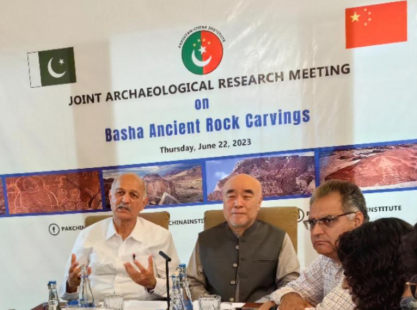
From August 19 to 21, 2023, more than 100 cave temple managers, researchers and conservation practitioners from China, Afghanistan, Pakistan, Iran, Nepal, Norway and the United Kingdom gathered in Dazu, Chongqing, China, to participate in the "International Forum on Cave Temples Conservation", focusing on the "Conservation of Cave Temples in the Context of Climate Change". Cave Temple Conservation in the Context of Climate Change", carried out a constructive and extensive discussions. At the opening ceremony of the forum, Dazu Institute of Rock Carving and Pakistan Khyber Pakhtunkhwa Provincial Archaeology and Museums Bureau signed a memorandum of understanding to establish a friendly partnership, the two sides will further strengthen exchanges and cooperation in cultural relics protection, utilization and management.
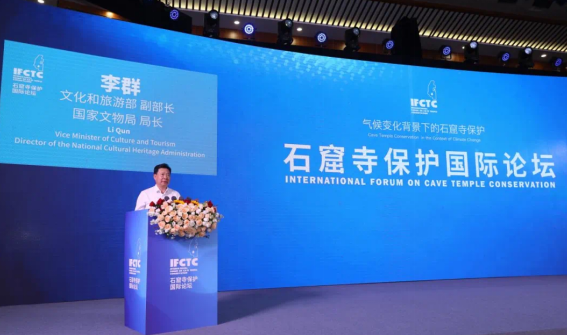
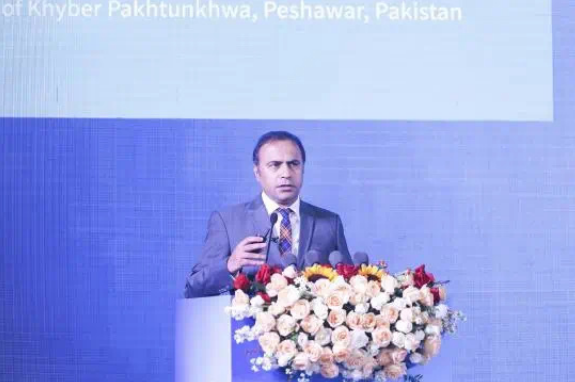
In August 2023, Hu Kaiqiang, Deputy Director of the Committee of Hong Kong, Macao, Taiwan and Overseas Chinese and Foreign Affairs of the Chongqing Municipal People's Political Consultative Conference (CPPCC), and Director General of the Multifunctional Economic and Trade Platform of the Shanghai Cooperation Organization (SCO) Countries, hosted the visit of Ms. Gohar, Advisor on Cultural Heritage Management of Pakistan's Water and Electricity Development Agency (WEDA), to the Multifunctional Economic and Trade Platform (METP) of the Shanghai Cooperation Organization (SCO) Guajia, accompanied by Chen Tao, Executive Director of the Platform Think Tank. Also attending the meeting were Mr. Wang Jianping, Deputy Secretary General; Mr. Kong Lingyuan, Professor of Archaeology, School of History and Social Sciences, Chongqing Normal University; Dr. Li Jin, Doctor of Shanghai Jiaotong University and Special Expert of Dunhuang Research Institute; Mr. Duan Huihai, Director of Cultural Business, Chongqing Wanyou International Travel Agency Limited Company; and relevant personnel of the Platform's Secretariat. Ms. Gohar said that China-Pakistan friendship has a long history and has a long history, and the historical and cultural heritage of the Silk Road has witnessed the cooperation and friendship between China and Pakistan across thousands of years. China and Pakistan have rich historical and cultural heritage, but at the same time face the problem of protection of historical relics, and hope to strengthen exchanges and cooperation with the Platform and make more contributions to the protection of historical and cultural heritage of SCO countries. At the symposium, Ms. Gauhar made a report on the theme of "Study on the Management of Ancient Heritage along the Upper Indus River in Northern Pakistan: Threats to the Rock Art Galleries in the Southern Section of the Silk Road and their Protection", introducing in detail the current situation of the cultural heritage of the Diarmo Basha Dam project and its protection plan, and had an in-depth exchange with the representatives of the symposium.
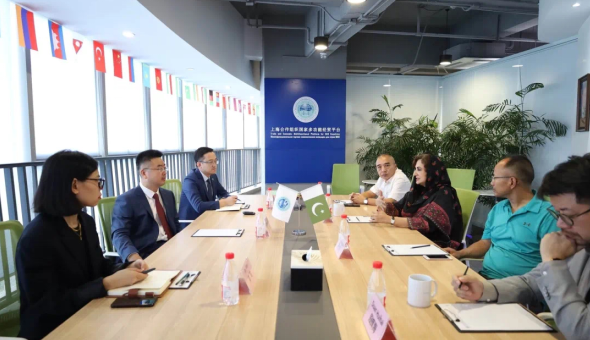
Professor Kong Lingyuan of the School of Archaeology and Literature and Museums of Chongqing Normal University is currently working on the project of Basha Dam Reservoir Area Cultural Heritage Protection and Utilization Planning Scheme, which mainly focuses on four aspects, namely, the protection of above ground cultural relics, the protection of underground cultural relics, the cultivation of local personnel as well as scientific research and utilization. First, there are thousands of rock carvings and cultural relics in the Basha Dam reservoir area, which need to be researched on-site and demonstrated in terms of the environment of the reservoir area and the conditions of cultural relics protection. For the general ground rock carvings, it is proposed to carry out an overall research and to protect them in a variety of ways from the establishment of museums for physical preservation (off-site relocation and centralized preservation), data collection (three-dimensional digital information extraction, image recording, and facsimile printing of topographies) and so forth. Secondly, on the basis of universal systematic field investigation, rescue archaeological excavation of ancient sites and tombs involved in the reservoir area. Underground burials, sites and other cultural relics, in the funds and heritage protection conditions permit, make every effort to implement salvage excavation protection. For the underground cultural relics that cannot be salvaged through archaeological excavation, comprehensive information such as the specific distribution location, distribution area and cultural appearance of the relics will be collected. The unearthed relics are delivered to the Pakistan Museum for protection and display, or the museum of the reservoir area is set up when conditions are favorable. Thirdly, the technical team of the project can negotiate and set up corresponding training courses to assess and train relevant vocational skills according to the comprehensive conditions of local community residents' education and personal character, and when possible, they can go to the protection site for observation and learning, and practical operation. Should fully explore the talents, for the establishment of the reservoir area museum reserve force. Fourth, carry out comprehensive research on aboveground and underground cultural relics from a multidisciplinary perspective. Establish a database of petroglyphs and stone carvings in the upper reaches of the Indus River, as well as a database of underground cultural relics remains in the reservoir area. Plan and publish a number of research results that are in line with the level of development and characteristics of contemporary archaeology.
Next: Man drowns in Muar river while testing boat
Related Reading
- Malaysia's durians, other agricultural exports to see boost under RCEP trade agreement
- First death in Tonga volcano blast as nation remains cut off
- US ropes in Quad allies to fight ‘two-front wars’ with China and Russia despite spent force
- Malaysia’s mangrove-planting fishermen stumble across nature finance hurdle
- American troops in Japan stay on-base for two weeks after virus spread
- S.Korea’s daily new COVID-19 count exceeds 13,000 for the first time
- New Development Opportunities: State Government Aims to Include Forest City's SFZ in the Johor-
- " Celebrate Chinese festivity During the Incredible Lantern Festival." 2022 Global Oversea
- Parañaque limits movement of unvaccinated
- "Panda's Singing" Kicks Off 2025 Chengdu International Children's Chorus Week
